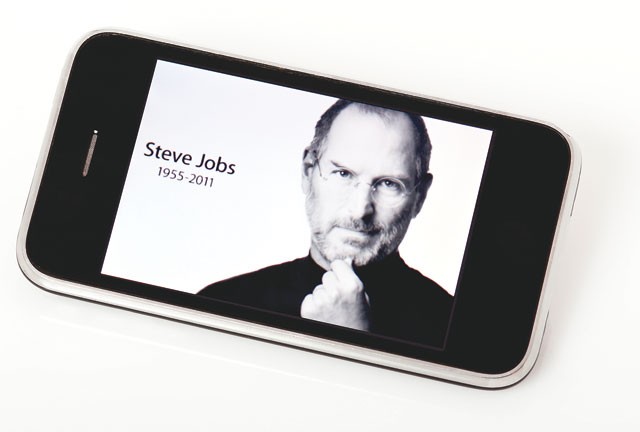As is the case whenever someone dies, all Steve Jobs’ personal shortcomings were forgotten on October 5. The day that Apple’s co-founder and top brain succumbed to cancer at age 56 all most of us could remember was how Jobs revolutionized every single arena he entered. Apple II and Macintosh made computers accessible to all; Pixar revolutionized digital animation; iTunes saved the music industry; iPhones turned telephones into platforms for music, photography, video, email, and web surfing; and the iPad launched tablet computing. To gauge Jobs' full impact, the music industry is one of the most obvious places to look. “I received this email on my iPhone while [sitting] here doing mixes for our CD in Pro Tools on this iMac,” Roberto Livar of San Antonio band Bombasta wrote the Current. “I wrote our set list and notes for our upcoming show on my iPad at rehearsal last night and stay in constant contact with our fan base via the social media that runs on all of the above products.”
Jeff Smith of the Hickoids credits Jobs for reducing piracy in music. “His vision provided a way to monetize digital downloads, something that was previously relegated largely to sharing and/or theft,” he said.
Music producer Gordon Raphael (the Strokes, Regina Spektor) resisted the Apple craze in music, for a time. “I held out against using any computers until 1998. I make music, and I thought, ‘Why would I want to watch a TV while I create music?'” Then he started working with Pro Tools and Mac computers and everything changed.
While I've never been a tech guy, I've always felt more comfortable with Mac products. They just feel better. In fact, Job's real triumph has been in revaluing the aesthetics of consumer products: He put the soul inside the machine, so to speak, and wrapped it all in one beautiful body. Under his direction, design came first and engineers had to adapt, not the other way around. After Jobs was forced out of Apple in 1985, the company began returning to the traditional force-the-guts-into-the-computer-box method. “When you do it that way, you come up with awful products,” Apple’s marketing chief Phil Schiller told Walter Isaacson, author of the superb critical biography Steve Jobs. When Jobs returned to Apple in 1996, design once again became paramount.
While what was in those computers proved transformational to millions, it was the Apple image that put U2 back on top of the world. Bono, another master at synching hip humanism with technology, was criticized for allowing the band to perform “Vertigo” for free in an iPod/iTunes commercial in 2004. But the trade paid off: Apple sold tons of iPods and U2's How To Dismantle An Atomic Bomb sold 840,000 copies in its first week, reestablishing them as the biggest band in the world. Two years later, Jobs would design a special iPod for Bono’s Product Red campaign, which raised funds for the fight against AIDS in Africa. Even Bono ended up doing business with the Devil. Or did he?
“Let’s have a look,” Bono told the Chicago Tribune. “The ‘devil’ here is a bunch of creative minds, more creative than a lot of people in rock bands. The lead singer is Steve Jobs. These men helped design the most beautiful art object in music culture since the electric guitar. That’s the iPod. The job of art is to chase ugliness away.”
Steve Jobs obsessed more about stuff like the beauty of the computer’s power chord than business projections. Marketing and design, again, were his passions, but he had the soul of an artist. It was Jobs that delivered the now-legendary “Think Different” campaign. “We at Apple had forgotten who we were,” he told Isaacson. “One way to remember who you are is to remember who your heroes are.” The campaign, one of the most powerful in the history of advertising, featured black-and-white photographs of key historical figures (Chaplin, John and Yoko, Picasso, Miles, César Chávez, and many others) with the simple slogan, “Think Different.” Just a slogan and the Apple logo — even if there were questions about whether it was proper English.
“I never owned an iPod, iPad, iPhone, or any type of Apple computer,” Mexicans With Guns’ Ernest Gonzales defiantly wrote the Current. But even he was forced to reconsider, writing back minutes later: “But if the computer never became a household thing then there would be none of my music as I know it.”
At the upcoming 54th annual Grammy Awards in February, Jobs will be posthumously honored with a Trustees Award, one of the Special Merit Awards given every year by The Recording Academy to people who offer "a variety of brilliance, contributions, and lasting impressions on our culture" and who had "an indelible impact on our industry."
Few of us have not been touched by Jobs. But ultimately, his victory had nothing to do with computers or even the music industry. “This wasn’t about processor speed or memory,” he once said. “It was about creativity.”
He was damn right, and that’s why he changed not only one world, but several. In the process he changed us too by making beautiful and easy-to-use products allowing each of us to express ourselves more clearly.



















